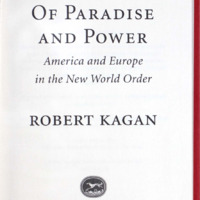-
Title
-
Of paradise and power : America and Europe in the new world order
-
Description
-
After years of mutual resentment and tension, there is a sudden recognition that the real interests of America and its European allies are diverging sharply and that the trans-atlantic relationship itself has changed, possibly irreversibly. Europe sees the United States as high-handed, unilateralist, and unnecessarily belligerent; the United States sees Europe as spent, unserious, and weak. The anger and mistrust on both sides are hardening into incomprehension. Author Robert Kagan reached incisively into this impasse to force both sides to see themselves through the eyes of the other. Tracing the widely differing histories of Europe and America since the end of World War II, he makes clear how for one the need to escape a bloody past has led to a new set of transnational beliefs about power and threat, while the other has evolved into the guarantor of that "postmodern paradise" by dint of its might and global reach.
-
Identifier
-
1082751
-
1400040930
-
Creator
-
Kagan, Robert
-
Format
-
1st ed.
-
Source
-
Brian Lamb Booknotes Collection
-
Gift of Brian Lamb, 2011.
-
Catalog record
-
Language
-
eng
-
Date
-
2003
-
Program air date: February 16, 2003
-
Publisher
-
Alfred A. Knopf
-
George Mason University. Libraries. Special Collections & Archives
-
Text
-
Transcription of Annotations
Front and back endpapers contain notes on the history of the relationship between the United States and Europe, the way the two see each other and themselves, and what their relationship might look like in the future. The two World Wars weakened and destroyed Europe as a global power and lead to its dependence on America during the Cold War years. It is pointed out that the need to present a united front disappeared with the fall of the Berlin Wall. Other notes state that Europe rejects America's "culture of death", its widespread use and possession of guns and its implementation of the death penalty, while the United States consider Europe to be weak, particularly militarily. Europe if accused of believing in power while it was strong and of exhibiting greater tolerance because of its increased weakness. Unlike Europe, America is willing to risk military confrontation and nuclear attacks. It is also noted that Europe spends much more on foreign aid per capita than the United States, and that a long period of American hegemony has only just started. It is predicted that by 2050 the American economy will be twice the size of Europe's and that the median age of the American population will 36.2 years compared to 52.7 years for the European countries. -- Annotations by Brian Lamb in the margins and underlining of pertinent phrases throughout the book. -- Examples: p. 29: "The United States and its European allies have had rather substantial disagreements over what constitute intolerable threats to international security and the world order." -- p. 39: "For Europeans, ideals and interests converge in a world governed according to the principle of multilateralism." -- p. 40: "For Europeans, the UN Security Council is a substitute for the power they lack." - p. 58: "Diplomacy, negotiations, patience, the forging of economic ties, political engagement, the use of inducements rather than sanctions, compromise rather than confrontation, the taking of small steps and tempering ambitions for success - these were the tools of France-German rapprochement and hence the tools that made European integration possible." - p. 72: "A commitment to Europe, not hostility to it, led the United States in the immediate postwar years to keep troops on the Continent and to create NATO." - p. 76: "The United States, with all its vast power, remains stuck in history, left to deal with the Saddams and the ayatollahs, the Kim Jong Ils and the Jiang Zemins, leaving most of the benefits to others."
-
Subject
-
"European Union."
-
"Post-communism--Europe."
-
Relation
-
Original Booknotes interview
-
Rights
-
This work may be protected by copyright laws and is provided for educational and research purposes only. Any infringing use may be subject to disciplinary action and/or civil or criminal liability as provided by law. If you believe that you are the rights-holder and object to Mason’s use of this image, please contact speccoll@gmu.edu.
 1082751.pdf
1082751.pdf